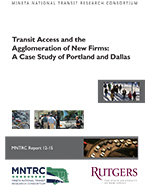Abstract:
The objective of this paper is to examine whether new firms are more likely to form near rail transit stations. Two relatively new light-rail systems—one in Portland, Oregon, and the other in Dallas, Texas—form the basis of the analysis. A geocoded, time-series database of firm births from 1991 through 2008 is analyzed using all firm births, firm births of various sizes, and firm births of specific industry sectors. A random effects, negative binomial model is used to examine associations between proximity to rail stations and other spatially defined variables.
Results show that newly formed firms tend to cluster around stations in the Portland region but not in the Dallas region. The difference between the two regions holds for different firm sizes and different industrial sectors. In all cases, there is a much stronger association between transit proximity and new firm birth in the Portland region compared to the Dallas-Ft. Worth region. In both regions, births of larger firms tend to be associated with greater proximity to transit stations, perhaps reflecting the greater agglomeration benefits that they receive. Different planning and zoning criteria in Portland versus those in Dallas may explain the relative success of Portland in achieving clusters of new firms near transit.
Publications:
Authors:
ROBERT B. NOLAND, PH.D.
Robert B. Noland is a Professor at the Edward J. Bloustein School of Planning and Public Policy at Rutgers University and serves as the Director of the Alan M. Voorhees Transportation Center. He received his Ph.D. at the University of Pennsylvania in Energy Management and Environmental Policy. Prior to joining Rutgers University he was Reader in Transport and Environmental Policy at Imperial College London, a Policy Analyst at the US Environmental Protection Agency, and also conducted postdoctoral research in the Economics Department at the University of California at Irvine. The focus of Dr. Noland’s research is the impacts of transport planning and policy on both economic and environmental outcomes. His work on economic effects has included examining behavioral reactions to changes in reliability, associations with the built environment, and trip-chaining behavior. Environmental work includes impacts on safety, climate, health, and other factors associated with overall quality of life. Active research areas include developing methods to evaluate the lifecycle greenhouse gas emissions associated with building transport projects; evaluating the economic impacts of transit-oriented development; analysis of walking behavior and links to other travel behavior and the built environment; analysis of traffic and pedestrian safety using spatial analysis techniques; and assessment of the economic effects of transport investments, in particular those associated with agglomeration externalities. Dr. Noland’s research has been cited globally in debates over transport infrastructure planning and environmental assessment of new infrastructure. Dr. Noland is currently Associate Editor of Transportation Research-D (Transport and Environment) and the International Journal of Sustainable Transportation. He also serves as Chair of the Transportation Research Board Special Task Force on Climate Change and Energy.
DANIEL G. CHATMAN, PH.D.
Dan Chatman is an assistant professor of city and regional planning at the University of California, Berkeley. He conducts research on travel behavior and the built environment; residential and workplace location choice; “smart growth” and municipal fiscal decision making; and the connections between public transportation, immigration and the economic growth of cities. Ongoing and recently completed research projects include studies addressing which U.S. transit systems succeed, and why; the implications of immigration trends for sustainable development and economic growth; the effects of dynamic pricing on occupancy and use of onstreet parking in San Francisco; and the relationships between residential location, travel, social interactions, and well-being.
NICHOLAS J. KLEIN, PH.D.
Nicholas J. Klein received his Ph.D. in Planning and Public Policy at the Edward J. Bloustein School of Planning and Public Policy at Rutgers University. He also has a master’s degree in urban spatial analytics from the University of Pennsylvania, where he focused on the use of Geographic Information Systems (GIS) and spatial statistics in studying transportation equity. He conducts research on travel behavior and public transit services in diverse communities. His dissertation examined the rapidly growing curbside intercity bus industry, including the so-called “Chinatown Buses.” In addition, he conducts research examining the travel behavior of marginalized populations, such as immigrants to the U.S., and gays and lesbians. At Rutgers, he has worked on several state and federally funded research projects examining public transit issues, particularly the intercity bus industry, the travel behavior of immigrants in New Jersey, and the impact of immigration on the transportation system and participation in public transit planning. Previously, he worked for PB Consult, helping metropolitan planning organizations develop and implement travel demand models.


